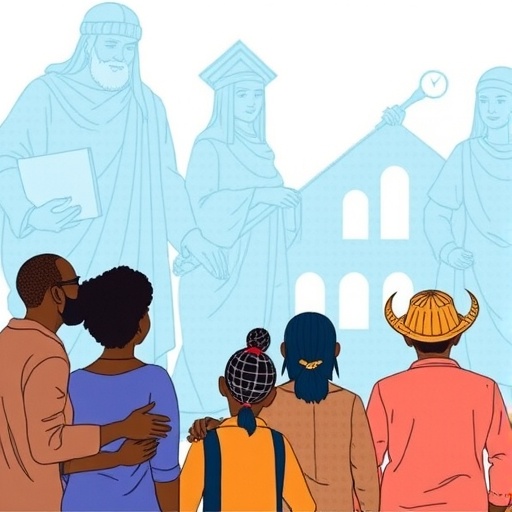In recent years, the educational landscape has become increasingly focused on understanding the socio-cultural factors that affect students’ learning experiences and outcomes. One of the more profound insights to emerge from this discussion is encapsulated within the framework known as the Brilliance–Belonging Model. Developed by researchers C.A. Bauer, A. Poddar, and E. Brummelman, this model delves into the intricate interplay between cultural beliefs about intellectual ability and educational equity. It highlights how these beliefs can manifest as significant barriers to students, particularly those from marginalized backgrounds.
The Brilliance–Belonging Model postulates that societal narratives often equate intelligence with inherent brilliance, positioning it as something that only a select few possess. This cultural framing influences not only students’ self-perception but also their academic engagement and overall educational trajectory. As students encounter environments that propagate these beliefs, they may start to internalize the notion that their intellectual capabilities are fixed, which can deter them from pursuing challenging academic opportunities. The ramifications of such belief systems can be severe, potentially leading to long-term academic disengagement.
Furthermore, this model suggests that a sense of belonging within educational settings is critical for fostering intellectual curiosity and motivation. When students perceive themselves as outliers or feel alienated due to the predominant narratives surrounding intelligence, their likelihood of thriving diminishes significantly. The underlying message is that feelings of belonging are paramount; without them, even the most talented individuals may struggle to excel. This assertion is critical for educators and policymakers aiming to create inclusive practices that recognize and celebrate diverse forms of intelligence.
The research conducted by Bauer and colleagues emphasizes that educational institutions must critically assess the cultural contexts in which they operate. The prevalent belief in a singular form of intelligence can marginalize students with diverse learning styles and backgrounds. The challenge lies in fostering environments that not only validate students’ diverse abilities but also promote a growth mindset—an understanding that intelligence can be developed through effort and perseverance rather than being an inherent trait.
Addressing these sociocultural dynamics also requires a concerted effort to dismantle stereotypes associated with particular demographic groups. The Brilliance–Belonging Model advocates for a shift away from reductive stereotypes that pigeonhole students based on race, gender, or socioeconomic status. Instead, educational stakeholders are encouraged to cultivate a broader understanding of intelligence that reflects an array of competencies and capabilities. This requires educational curricula that are rich in diversity and a pedagogical approach that emphasizes collaboration and mutual respect among all students.
The implications of this model extend far beyond the classroom environment. For instance, parental beliefs about intelligence can significantly influence children’s academic behaviors and aspirations. When parents convey messages aligned with a fixed mindset, it can limit their children’s engagement in academic pursuits, consequently perpetuating a cycle of disadvantage. Therefore, it is crucial to provide resources and education for parents, ensuring they understand how their beliefs can shape their children’s academic identities and experiences.
Moreover, the Brilliance–Belonging Model has profound implications for teacher training and professional development. Educators need to be equipped with the tools and knowledge to recognize their biases and the potential impact of cultural narratives surrounding intelligence. Training programs should focus on cultivating awareness and strategies to foster belonging among students who feel marginalized, which can ultimately enhance overall classroom dynamics and student outcomes.
Peer interactions within educational settings are also a focal point of the Brilliance–Belonging Model. Studies indicate that peer perceptions play an essential role in shaping students’ attitudes towards learning and their self-concept as learners. Positive peer relationships can foster an environment of support and encouragement, counterbalancing negative cultural narratives about intelligence. Consequently, schools should facilitate opportunities for collaborative learning that prioritize inclusivity and peer support.
Additionally, the model raises critical questions about assessment practices within educational institutions. Traditional assessment methods often favor a narrow definition of intelligence, which may not accurately reflect the capabilities of all students. Embracing a broader spectrum of assessment strategies can help identify and nurture various forms of intelligence, enabling a more equitable educational landscape.
The findings of Bauer and his co-authors stress the importance of creating educational policies that are responsive to the complexities of identity and intelligence. Educational equity can only be achieved when institutions actively work to dismantle barriers rooted in cultural beliefs and systemic inequalities. This necessitates a multifaceted approach that encompasses curriculum design, educator training, student support services, and family engagement.
As the global community navigates ongoing socio-political changes, the insights derived from the Brilliance–Belonging Model provide a vital framework for understanding the intersection of culture and education. Establishing environments where every student feels valued and capable is not merely a theoretical aspiration but a necessary condition for cultivating a just and equitable society. Moving forward, it becomes imperative that educational stakeholders commit to this vision, recognizing that all learners have the potential to shine brightly when nurtured within a culture of belonging.
In conclusion, the Brilliance–Belonging Model elucidates the need for a paradigm shift in how society views intelligence. By fostering a culture where diverse forms of intelligence are recognized and valued, educational systems can begin to dismantle the inequities that currently exist. Through intentional policy reform and the promotion of inclusive practices, we can embark on a journey toward educational systems that empower all students, regardless of their backgrounds, to fulfill their potential.
Subject of Research: Cultural beliefs about intellectual ability and educational equity.
Article Title: The Brilliance–Belonging Model: How Cultural Beliefs About Intellectual Ability Undermine Educational Equity.
Article References:
Bauer, C.A., Poddar, A., Brummelman, E. et al. The Brilliance–Belonging Model: How Cultural Beliefs About Intellectual Ability Undermine Educational Equity.
Educ Psychol Rev 37, 64 (2025). https://doi.org/10.1007/s10648-025-10034-2
Image Credits: AI Generated
DOI:
Keywords: Brilliance, Belonging, Educational Equity, Cultural Beliefs, Intelligence, Growth Mindset, Inclusion, Marginalization.




